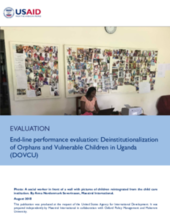The objective of this evaluation is to assess the performance of the “Deinstitutionalization of Orphans and Vulnerable Children Project in Uganda” (DOVCU) with regards to the creation of sustainable changes in the lives of two beneficiary groups, namely 43,000 vulnerable children living in targeted households and 2,000 children at risk as a result of an integrated package of support. A second objective was to assess how and if these results came about from systems changes and identify which strategies and approaches were the most effective for achieving the change in children’s lives. The evaluation responded to 25 specific evaluation questions regarding the projects impact, relevance, effectiveness, efficiency and sustainability and also assessed the projects results from the point of view of its contribution to human rights.
The DOVCU project was a complex and ambitious project. The evaluation concludes that the project to a large extent has demonstrated an effective and relevant package, methods and strategy to prevent separation of children. The project faced some challenges in the design when it comes to the reintegration component of the project. At the time when the project selected the areas where it focused its prevention work, the places of origin of the children to be reintegrated was not known. As a result, the project interventions for prevention, which could have been beneficial to the households that received children for reintegration, only benefited a few of the children who were reunified with their families. This said the project has contributed to a significant change in mindsets around the importance of family care for children, it has managed to break the trend of an increasing number of CCIs opening up in the 12 focus districts, and the project furthermore significantly strengthened knowledge, skills and professional practices of district, sub-county and community stakeholders involved in alternative care. 16 Overall, there is great enthusiasm created around the DOVCU project which most stakeholders consider as a success.

